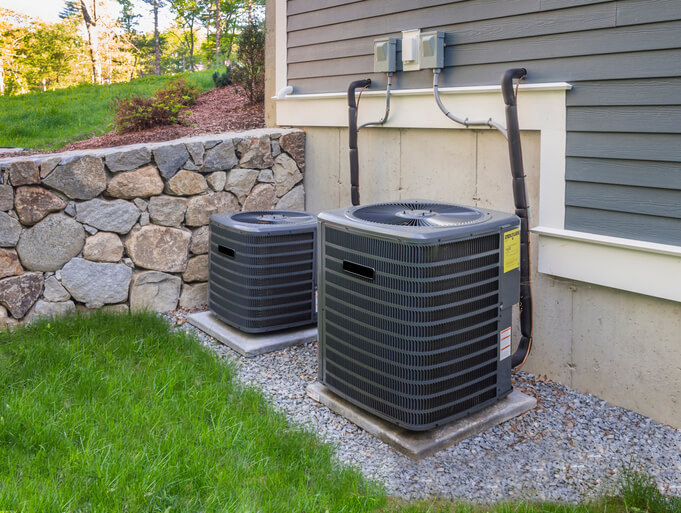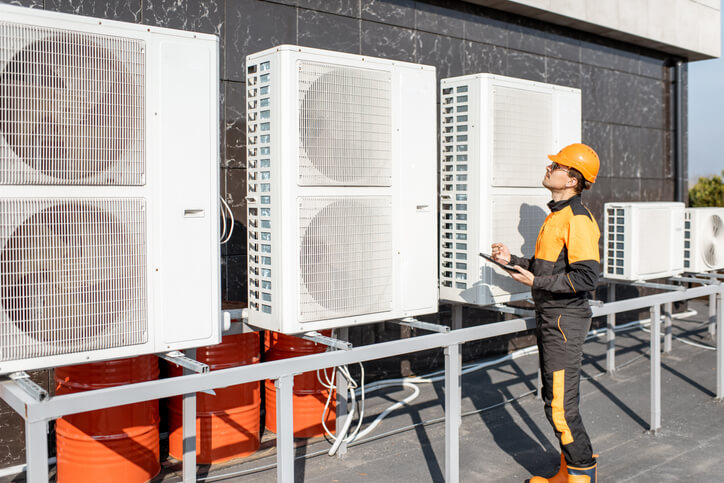Commercial vs. Residential HVAC – What is the Difference?
When it comes to commercial vs. residential HVAC, it’s safe to say that no two systems are alike. Of course, the HVAC needs are going to be far different from that of a residential home. And, while commercial and residential units primarily serve the same purpose of heating, cooling, and ventilation, there are some significant differences too. Here at The Severn Group, we specialize in commercial HVAC. So, we know first hand just how unique these two systems can be in terms of size, location, and manufacturing. Here are some of the most common differences between commercial and residential HVAC units.
1. Size & Complexity

Residential HVAC systems are typically single, stand-alone units that are often located in the backyard or against the side of a house.
Commercial HVAC systems are much larger than residential systems. This makes sense because commercial buildings require more power and energy to heat and cool a larger facility. Typically, the larger the building, the larger the HVAC system needs to be.
Not to mention, there’s more to expect from a commercial HVAC system. Hence, the unit is more complex to meet these needs. Think about the comfort needs of a warehouse vs. a single-family home. Not only is a commercial building much larger, but it may also have to account for several thermostat settings for separate office rooms. Conversely, a residential HVAC system usually only has to cover the heating and cooling needs of a small space. As a result, commercial HVAC systems require more complexity in their design and function.
2. Location
Frequently, residential HVAC systems sit in the backyard or rest against the side of a house. This particular location allows for easy access for technicians while staying out of plain sight.
On the other hand, a commercial HVAC system typically rests on the roof of a building due to its larger size. Commercial units are also much louder than residential units, which makes the rooftop a more favorable location. This eliminates the potential for any noise disturbances that may affect the building’s occupants. The roof also allows service technicians to access the system safely for maintenance and repairs.
3. Manufacturing and Installation

Commercial units typically rest on the roof of a building due to its larger size. This allows technicians to access the system safely for maintenance/repairs.
There are also some significant differences when it comes to the installation of commercial vs. residential HVAC systems. For instance, residential systems are single, stand-alone units that cannot be modified or expanded. And, for split residential HVAC systems, parts of the system do not rest in the same location. They split between the indoors and the outdoors.
In contrast, commercial HVAC systems are manufactured as modular units. Once installed, the system allows for easy maintenance and upgrade. This is because the components of the system are housed in one cabinet, which is known as a packaged unit. Also, commercial HVAC parts can be added or taken away to change the heating and cooling needs of each building.
4. Maintenance Requirements
The maintenance requirements of a commercial HVAC system differ significantly from residential systems. Since residential HVAC units are less complicated, some homeowners can complete the basic maintenance themselves. This includes cleaning and changing the air filters and other minor tasks.
However, due to the size, location, and complexity of the components in a commercial system, you’ll need the help of an experienced and skilled technician to perform maintenance. Commercial HVAC technicians will be familiar with the unique structure. Not to mention, repairs on a commercial unit can be much more expensive than residential systems. Therefore, it is essential to keep up with regularly-scheduled maintenance on your commercial systems. That way you can prevent HVAC problems before they turn into an expensive repair.
The Severn Group Can Help
If you need commercial HVAC servicing, contact The Severn Group today, or call 443-837-0828. We’ll work together to create solutions for all of your goals, from installation to design and build. We can also help you avoid commercial HVAC problems with preventative maintenance. If you are a facility or operations manager, sign up for our maintenance program today. You’ll be glad that you did.
